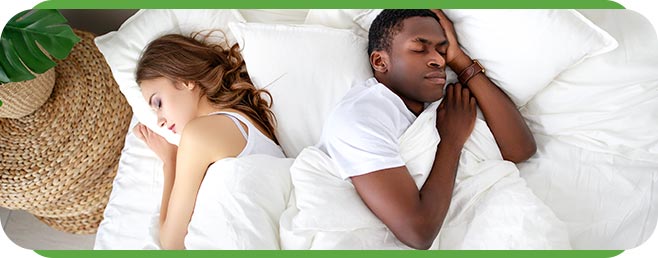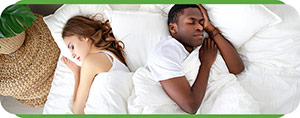Gender Differences in Sleep Patterns and Disorders
Gender differences in sleep patterns show that women are more likely to experience insomnia and restless leg syndrome, while men are more prone to sleep apnea. Hormonal changes and societal roles significantly impact sleep quality and behaviors differently across genders, contributing to these disparities. If you are struggling with sleep, come to the Koala® Center For Sleep & TMJ Disorders. For more information, please contact us or book an appointment online now! We have convenient locations across the USA in Bloomington IL, Peoria/Dunlap IL, El Paso TX, and Wausau WI.


Table of Contents:
How do sleep needs and challenges differ between men and women?
What is the impact of hormonal changes on sleep quality?
What are the gender-specific treatment approaches for sleep disorders?
Sleep disorders affect millions of people worldwide, and men and women often experience these issues in unique ways due to various biological factors that are at play. With their expertise in gender-specific differences when it comes to sleep health, sleep medicine doctors can provide highly effective, personalized care.
Women require slightly more sleep than men, about 11 minutes more per night. In addition, studies have shown that women spend more time in deep sleep and usually fall asleep faster than men. During the luteal phase of the menstrual cycle, increased progesterone levels can lead to sleepiness, while hot flashes and night sweats during menopause can cause fragmented sleep. In addition, mothers often experience interrupted sleep due to childcare, which may result in chronic sleep deprivation and increased fatigue.
Furthermore, some sleep disorders are more prevalent in one gender than the other. For example, women are more prone to insomnia and restless legs syndrome (RLS), while men are more likely to suffer from sleep apnea. Men’s higher likelihood of having obstructive sleep apnea (OSA) is related to differences in upper airway anatomy and body fat distribution.
Testosterone plays a vital role in men’s sleep quality. Fluctuating testosterone levels, which peak during sleep, affect sleep patterns. As men get older, testosterone levels decline, leading to reduced sleep quality and increased nighttime awakenings.
Just like testosterone affects men’s sleep quality, estrogen and progesterone influence women’s sleep. Throughout the menstrual cycle, women experience various hormonal fluctuations. For example, the premenstrual phase, which is characterized by symptoms like cramps and mood swings, can increase instances of disturbed sleep.
In addition, during pregnancy, increases in progesterone can cause excessive daytime sleepiness and frequent nighttime awakenings. Back pain and frequent urination often disrupt sleep during pregnancy. The transition to menopause involves decreased levels of estrogen and progesterone, resulting in symptoms such as hot flashes and night sweats, leading to a decline in sleep quality. Postmenopausal women also have an increased risk of developing sleep apnea.
Both men and women are affected by cortisol, commonly referred to as the “stress hormone,” as well as the “sleep hormone,” or melatonin. Melatonin regulates the sleep-wake cycle, and its production can be influenced by age, light exposure, and lifestyle factors. In addition, elevated cortisol levels, often due to stress, are associated with challenges in falling and staying asleep.
Gender-specific treatment approaches for sleep disorders consider the differences between men and women. Some of the common treatments for sleep disorders and their applications for each gender include:
● Cognitive behavioral therapy for insomnia (CBT-I) – For both men and women, CBT-I may focus on stress management techniques, relaxation strategies, and creating a consistent sleep schedule. Specifically for women, CBT-I can be tailored to manage the stress and anxiety related to PMS symptoms, menopause, pregnancy, and other instances of hormonal fluctuations.
● Medications – Women are more likely to report side effects from sleep medications, potentially due to differences in body composition and metabolism. On the other hand, men might require higher doses of certain medications.
● Hormone replacement therapy (HRT) – HRT can significantly improve sleep quality in menopausal women. While HRT is not typically used for sleep disorders in men, testosterone replacement therapy may be considered in cases where low testosterone levels contribute to sleep problems.
● Lifestyle changes – Both women and men can benefit from exercise routines and stress reduction techniques, like meditation or deep-breathing exercises. Weight management is specifically important for managing sleep apnea.
By working with a sleep medicine doctor, you can find the right approach to successfully treating your sleep concerns through a treatment that is tailored to your unique needs, lifestyle, and hormonal balance. For gender-specific sleep disorder care, schedule a visit to Koala® Center For Sleep & TMJ Disorders.

Additional Services You May Need
▸ KoalaKIDZzz®
▸ Sleep Apnea
▸ Snoring
▸ TMJ Disorder
▸ Fatigue
▸ Sleep Disorders
▸ Weight Loss
▸ CPAP Alternative
▸ Oral Appliances




